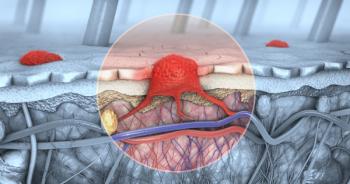
Form of Vitamin B3 Reduced Non-Melanoma Skin Cancer Occurrence
Nicotinamide, a form of vitamin B3, reduced the incidence of non-melanoma skin cancers among a group of high-risk patients, according to the ONTRAC study.
The use of nicotinamide, a form of vitamin B3, reduced the incidence of non-melanoma skin cancers by 23% among a group of high-risk patients, according to the results of the Australian ONTRAC study
“Obviously we still need to use sunscreen and other skin cancer prevention strategies, but we now have an additional exciting opportunity for affordable skin cancer prevention, which we can instantly translate into clinical practice,” said Diona Damian, MBBS, PhD, a professor of dermatology at the University of Sydney, Australia, noting that the use of nicotinamide is recommended for high-risk patients and not for the general population.
The ONTRAC study included 386 high-risk patients defined as people who had at least two skin cancers in the last 5 years (average of 8). Patients were randomly assigned to nicotinamide at 500 mg or placebo for 12 months. According to Damian, nicotinamide actively provides skin cells with an “energy boost,” enhancing DNA repair and protecting the skin’s immune system from ultraviolet light. Patients were evaluated for new non-melanoma skin cancers every 3 months with new cancers confirmed using biopsy.
After 12 months, use of nicotinamide resulted in a relative rate reduction of 0.23 for non-melanoma skin cancer (95% confidence interval [CI], 0.04–0.38; P = .02) after adjustment for non-melanoma skin cancer history and study center. Nicotinamide also resulted in a relative rate reduction of 0.20 for basal cell carcinomas (95% CI, 0.06–0.39; P = .10) and 0.30 for squamous cell carcinomas (95% CI, 0.0–0.51; P = .05).
Damian said that a reduction in skin cancer was seen as early as the first 3-month visit and that the benefit was no longer seen after patients stopped taking the tablets at 12 months.
The researchers also evaluated if nicotinamide reduced actinic keratosis and found an 11% reduction in patients taking nicotinamide at 3 months (P = .01), a 14% reduction at 6 months (P < .001), a 20% reduction at 9 months (P < .0001), and a 13% reduction at 12 months (P < .005) compared with placebo.
Damian noted that nicotinamide is different from niacin, a different form of vitamin B3 that has a number of adverse effects like headaches, flushing, and low blood pressure, none of which were seen in patients taking nicotinamide.
Commenting on the results of this study, ASCO President Peter Paul Yu, MD, FACP, FASCO, said, “This is a very exciting prevention trial. You know we clamor for cancer prevention rather than treating the disease, and this is a major advance for us.”
Newsletter
Stay up to date on recent advances in the multidisciplinary approach to cancer.











































